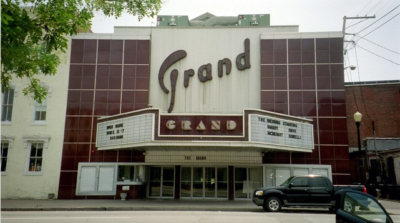NEW BOOKS AND HOMETOWNS

The Grand Theater, in downtown New Albany, Indiana, where I spent many babysitting quarters. If you scrunched down low enough in the seat–meaning you crouched on the floor–the ushers were unable to spot you, meaning you got the second showing for free.
New Albany is more or less a character itself in my upcoming collection of short stories Somebody Should Have Scolded the Girl, due out early fall from Fawkes Press. They say you can’t go home, but mining the town I grew up in for stories certainly made me appreciate where I came from and helped me to understand why I felt so driven to leave. Part of it was geography–I wanted the wide horizons of the West, as they felt familiar to me, even as I watched on the nightly news hippies being baptized in the Pacific Ocean, but part of it I understand was simply the lure of my own beckoning story. There was a life out there I glimpsed but did not fully imagine. Still, I knew I would recognize it when I got to it. Even at a young age I felt the draw of an energy that was bigger than what I had come from. New Albany simply never felt like home to me.
I’m reading a book right now called The Boundaries of her Body by Debran Rowland. It’s a mind-blowing account of the history of women’s rights in the U.S. Rowland takes a magnifying glass to what amounts to the story of all of us, immigrant and native, exploring gender hierarchy–and how we got to such a messy place to begin with (hint: [but you knew this] it starts with Religion with a capital R)–as well as body politics, sex and sexuality, women’s worth and value, rape and assault law, and relationship abuse. I’m reading it because since the death of my father in December of 2015, I’ve been trying to understand my relationship with him. This exploration also informs the collection, as I strive to examine women’s relationships with each other, their families of origin, their children, spouses, and their communities. It looks at characters who fight for their independence from what culturally has bound them, while pursuing the inclination to screw up what little freedoms they have, and the ways in which they fight to free themselves, to redeem themselves and, in the process, regain a sense of freedom.
The book takes place in the 1970s, so, go-go boots and women “acting up” are features, but what matters about this book to me is that it is the first time I’ve ever really looked hard at my Southern Indiana upbringing and what happened to me there, as well as the non-fictionalized truths of my Appalachian heritage. Previously, I’ve cast characters in my books from deep in Appalachia, but my family comes from the very westernmost edge of that region in south-central Kentucky. We settled into so-called “hollers,” but we were less than twenty miles from an area known as “the Flatwoods.” That gave us an opinion about ourselves–that we were just a tiny bit better than people who came from deeper into Appalachia: we had regular access to town.
What I had access to in New Albany was The Grand movie theater, where, for a quarter, I gave berth to my passion for story. In truth, those quarters weren’t always spent on the movies, for I spent many of my Saturday afternoons sitting on the floor of the public library, reading every art book on the shelves, then filling a paper bag with as many books as I could carry for the bus ride home. You’ll see glimpses of the library in several of these stories, along with a number of historic landmarks from New Albany, some of which I was forced to rename. Turns out you have to be careful about mentioning historic landmarks, especially if your protagonist happens to be a woman delivering babies in the basement of a bar—and then making them available for adoption for a price. Or if she is a teenager working in one of those historic landmarks as she waits out her boyfriend’s mental health commitments. Mustn’t stain the reputation, or so my editor has told me, by associating questionable activity with the kind of real-life place where your granny’s Saturday garden club is apt to tour.
Just wouldn’t be good for anyone’s reputation.
Photo credit: http://cinematreasures.org/theaters/24386/photos/17387